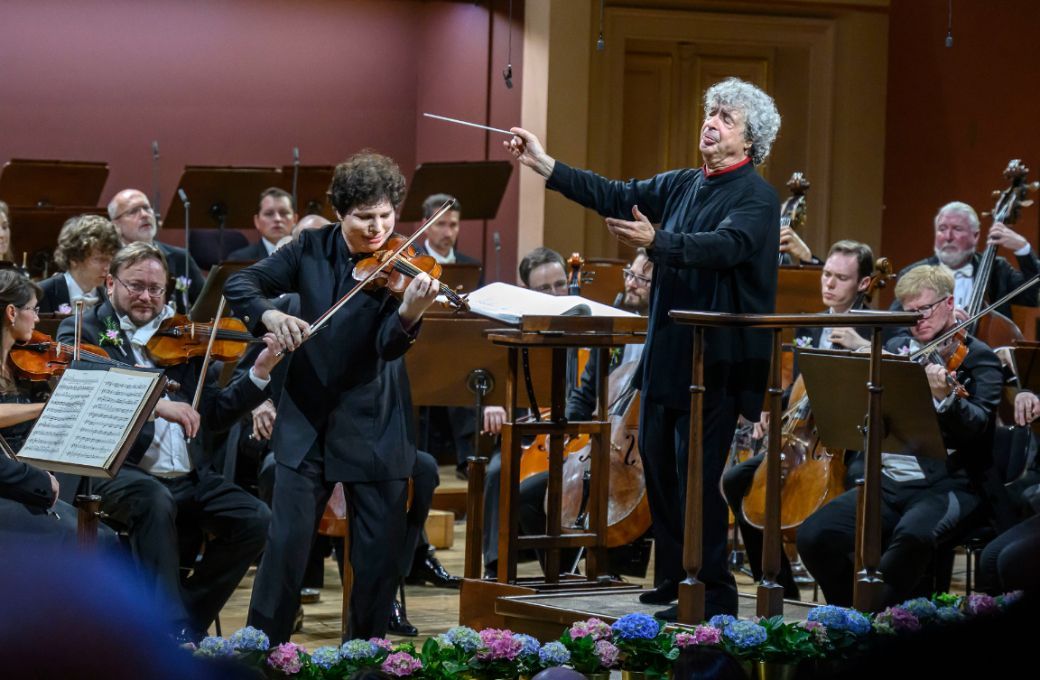The final strains of the Dvořák’s Prague festival had barely faded at the Rudolfinum when the Czech Philharmonic took the stage for its season opener with... an all-Dvořák program! There is no such thing as too much Dvořák in Prague, and in this case there was certainly no lack of imagination. The program set the tone and framework for the entire season, and with Semyon Bychkov on the podium and violin phenomenom Augustin Hadelich making his debut appearance with the orchestra, the music sounded fresh and inspiring.
As an aperitif the orchestra offered In Nature’s Realm, the first of three overtures originally composed as a triptych in 1891. The second, the festive Carnival Overture, is the one that most often appears on concert programs. Gentler and more melodic, In Nature’s Realm is a walk through a sun-dappled forest brimming with birdsong, in sound and spirit closely related to Beethoven’s “Pastoral” Symphony. Bychkov kept it buoyant and relaxed, highlighting the colors and caressing the melodies, acknowledging the symphonic dimensions of the piece without pursuing them. In his hands, the power of the piece was in the imagery.
Hadelich has garnered worldwide acclaim on the strength of virtuoso skills and a unique voice that makes every piece he plays his own. The novel inflections, phrasing and dazzling bowing are not inventions – they’re his natural style, played with a focused intensity that takes the music to another level. The achingly beautiful tone of his 1744 Guarneri helps, though not always. By the final movement of Dvořák’s Violin Concerto in A minor, it sounded a bit too sweet and too small to fill the large acoustic demands of a modern concert hall.

Still, his command of the piece and ability to weave a spell with it were impressive, the latter due in no small part to Bychkov's superb support. Between rich romantic swells, he provided silken backdrops for Hadelich, giving the music eloquent expression without getting in the soloist’s way. At times it was like watching a juggler in action, with Bychkov looking one way to modulate the orchestra, another to keep Hadelich on track, creating a dialogue between the two and then picking up the volume and pace to pull it all together for a slam-bang finish. An encore of Carlos Gardel’s Por una Cabeza gave Hadelich a chance to show his versatility and the narrative backbone of his work.
Bychkov put a fresh patina on Dvořák’s Symphony no. 8 in G major with a brisk tempo that added some snap to familiar melodies. Graceful strings, close attention to details and exquisite balance and clarity added vitality and heightened the sense of hearing something new. The depth of feeling that Czech musicians bring to this music was still at the core, but with a smart, sophisticated finish. This was refined Dvořák, with all the soft edges sharpened and the melodies given a glow and the undercurrent of excitement building organically to a galloping finale.
And this is what audiences in Korea and Japan will hear when the orchestra takes it on tour next month, an early kick-off to the Year of Czech Music, a decennial celebration that this time will not only celebrate Czech composers at home, but take their music abroad. As musical missionaries, Bychkov and his players are off to a promising start.


